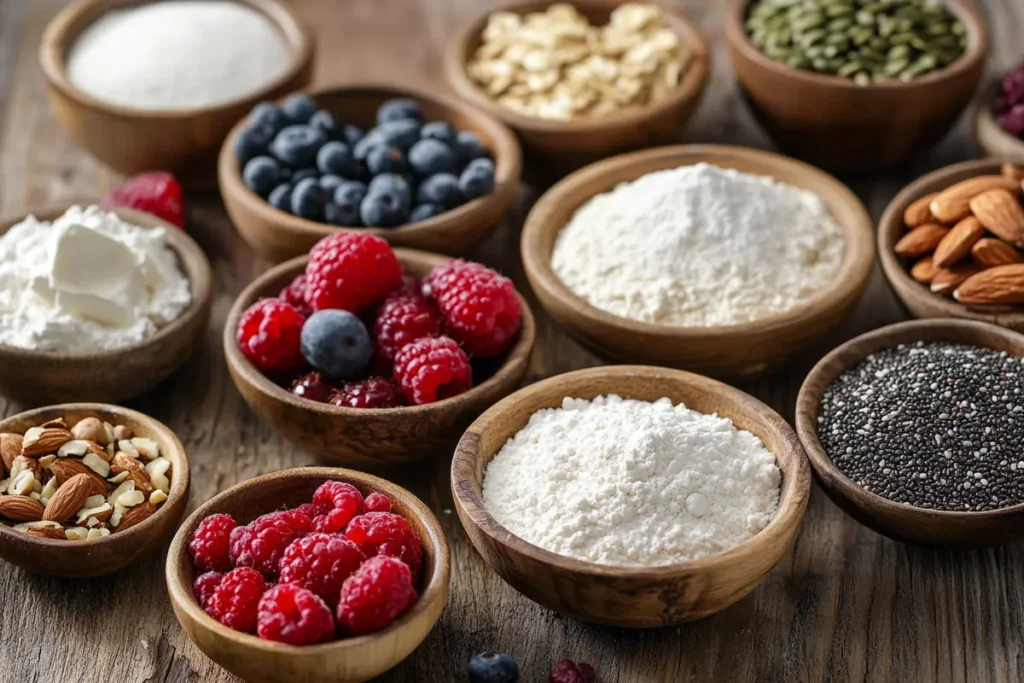The aroma of freshly baked goods wafting from the kitchen on a weekend morning – who can resist? Pastries hold a special place in many of our hearts, especially when it comes to breakfast. From flaky croissants to sugary doughnuts, these treats are undeniably tempting. But is starting your day with a pastry a good idea? This article dives deep into the question, “Can you eat pastry for breakfast?” We’ll explore the appeal of these morning delights, delve into their nutritional profiles, and weigh the pros and cons of making them a regular part of your diet. Moreover, we’ll discuss healthier alternatives and offer expert opinions to help you make informed choices about your morning meals. We’ll also tackle some common questions, aiming to provide a complete guide to enjoying pastries mindfully, without sacrificing your health goals. So, let’s get started and unravel the mystery behind that delicious breakfast pastry!
The Allure of Pastries: Why We Love Them for Breakfast
The Comfort Factor: Why are pastries so appealing in the morning?
Let’s face it, there’s something incredibly comforting about sinking your teeth into a warm, buttery pastry first thing in the morning. Think about it: that soft, fluffy texture, the sweet taste, maybe a little bit of chocolate or fruit…it’s like a little hug for your soul! Pastries often evoke a sense of nostalgia and happy childhood memories, which contribute to their magnetic appeal, especially when you’re just waking up. Moreover, the simple act of treating yourself to something delicious can make your whole morning feel just a bit more special. Therefore, it’s no wonder we are drawn to these little pockets of deliciousness.
Cultural Significance: Pastries as breakfast staples around the world
Did you know that pastries aren’t just a western thing? All around the world, different cultures have their own beloved breakfast treats. For example, you might have a sweet breakfast of doughnuts in the US, while in France, croissants reign supreme. Over in Spain, you will find churros as a typical option, and in many Latin American countries empanadas are also a staple for morning pastries. Each culture has shaped and adapted these bakery breakfast items to fit local tastes and traditions. So, it is clear to see that the love for a sweet start to the day is widespread!
The Sensory Experience: The appeal of textures, flavors, and aromas of pastries
Beyond the cultural aspects, the sheer sensory pleasure of enjoying a pastry is undeniably captivating. The way a flaky croissant crumbles in your mouth, the rich buttery flavour, or the sweet burst of a jam filling…it is a multisensory experience that’s hard to resist. The aroma of freshly baked goods is also a powerful trigger, making your stomach growl even before you take the first bite! From the subtle crunch of a sugar crust to the soft, yielding interior, these textures and flavours combined make pastries a truly irresistible part of our morning routine.
The Convenience Factor: Why Pastries Are a Grab-and-Go Choice
In today’s fast-paced world, convenience is king, and pastries fit the bill perfectly. They’re the ultimate grab and go breakfast option. When you’re rushing to get out the door, grabbing a muffin or a danish pastry from your local bakery is a quick, easy, and satisfying option that requires almost no effort. Moreover, you don’t need any utensils or a plate to enjoy them, making pastries an incredibly handy solution for busy mornings.
Nutritional Breakdown of Common Breakfast Pastries

Common Culprits: A Look at Butter, Flour, and Sugar in Pastries
The delightful taste of pastries often comes at a nutritional cost, primarily due to their key ingredients: butter, flour, and sugar. Butter, of course, contributes a high amount of saturated fats, while the refined flour in most pastries is low in fibre and nutrients. Consequently, these are not the healthiest choices for a start to your day. The sugar is what provides that sweet taste we crave, but it’s often added in significant amounts. As a result, each bite of a standard pastry can pack a serious punch of calories and less-than-ideal fats. Therefore, it is important to consider what ingredients these bakery breakfast items are made of.
Calorie Content and Impact: Understanding the Energy in Each Bite
Generally speaking, pastries are quite high calorie. A single croissant, for example, can easily contain 200-300 calories, and that’s before you consider any fillings or toppings. Similarly, muffins and doughnuts often pack even more calories per serving. This high calorie content comes mostly from the fats and sugars. Therefore, indulging frequently in sugary breakfast pastries can easily contribute to a calorie surplus, which, in the long term, can cause weight gain if you’re not careful. And if you are trying to lose weight, you may want to consider whether or not “Can you eat pastry for breakfast“
The Fat Factor: Saturated, Unsaturated, and Trans Fats in Pastries
Now, let’s talk about fats. Pastries are notorious for containing a good amount of saturated fats from the butter they use. Too much of these saturated fats can raise cholesterol levels, increasing the risk of heart disease. Also, some pastries might contain trans fats, which are even worse for your health and are often found in commercially baked goods. In contrast, it’s worth noting that there are some unsaturated fats, mainly from nuts or seeds, but these are very small proportions compared to saturated and trans fats. It is important to remember that healthy fats are essential for your body to function well.
Simple vs. Complex Carbs: The impact on blood sugar levels
The carbohydrates in pastries come largely from refined flour, which means they are mostly simple carbs. These simple carbs are rapidly digested, causing a quick spike in blood sugar levels. Following that spike comes an equally quick crash, leaving you feeling tired and hungry again soon after eating. In contrast, complex carbs found in whole grains digest more slowly, offering a steady release of energy and keeping you feeling full for longer. Therefore, choosing whole wheat pastry or healthy alternatives would make better breakfast habits.
Micronutrient Deficiencies: Vitamins and minerals in pastries
While pastries might provide you with calories, they’re unfortunately quite low in essential micronutrients like vitamins and minerals. You’ll find very few vitamins or minerals in a traditional pastry. They typically lack vital nutrients like vitamin C, vitamin D, calcium, iron, or fiber, which are all crucial for good health. So, while pastries might satisfy a craving, they do little to nourish your body with the vital nutrients it needs. Therefore, you should try to eat nutrient dense food throughout the day.
Potential Downsides of Regularly Eating Pastry for Breakfast
The Sugar Rush and Crash: The effects of high-sugar pastries
As we mentioned before, many breakfast pastries are loaded with sugar. This high sugar content leads to an immediate boost in energy, a “sugar rush,” which is quickly followed by a sharp drop, often called a “sugar crash.” You’re likely to feel tired, irritable, and less focused after the initial energy boost has faded. If you consistently start your day with high sugar pastries, this constant rollercoaster of energy levels can make it hard to concentrate and maintain stable energy. This, in turn, makes one wonder “Can you eat pastry for breakfast?”
Weight Gain Concerns: The link between pastry consumption and weight
Given their high calorie content and low nutritional value, frequent pastry consumption can certainly contribute to weight gain. The combination of saturated fats and simple carbs in pastries is a recipe for storing excess body fat if you are not balancing your pastry intake with physical activity. Moreover, the sugar in pastries can also contribute to sweet cravings, making it more difficult to stick to a balanced diet. Therefore, for those aiming to maintain a healthy weight, pastries should be a treat to have on occasions rather than a daily staple.
Heart Health Risks: How pastries can impact cardiovascular health
The saturated fats and trans fats present in many pastries can negatively impact your heart health. Too much of these unhealthy fats can lead to elevated levels of bad cholesterol, which can increase the risk of heart disease and stroke. Moreover, high sugar intake is also linked to an increased risk of cardiovascular issues. Consequently, it’s important to be mindful of your pastry intake to protect your heart health.
Digestive Issues: The impact of pastries on gut health
Because they are low in fiber, pastries aren’t the friendliest option for your digestive system. Fiber is essential for healthy digestion, and without enough of it, you might experience digestive issues like bloating, constipation, and irregular bowel movements. Furthermore, excessive consumption of sugary and refined flour based products can disrupt your gut microbiome. These effects also make you question “Can you eat pastry for breakfast?”
Energy and Mood Swings: The effect of a pastry-heavy start to the day
Starting your day with a pastry may initially lift your spirits, thanks to the sugar. However, that sugar high is quickly followed by a drop, causing mood swings and leaving you feeling sluggish. This can have a domino effect on your entire day, affecting your productivity, focus, and overall mood. Moreover, the constant cycle of sugar highs and lows can be disruptive. Consequently, a more balanced breakfast that provides sustained energy would definitely be a better option.
Healthier Alternatives to Traditional Breakfast Pastries

Making Smart Swaps: Whole grains vs. refined flours in pastry
If you’re a pastry lover, there’s no need to completely give them up. However, making some smart swaps can dramatically improve their nutritional profile. For example, instead of refined flour, opt for whole grains. Whole wheat flour, oat flour, or even a mix of gluten-free flours can add more fiber and nutrients to your pastries. Moreover, these swaps help you slow down the absorption of sugars and maintain more stable energy levels. Therefore, you can make your breakfast pastries a more nutritious choice, as well as satisfying your sweet tooth.
Lowering the Sugar Content: Natural sweeteners and strategies for healthier baking
Another significant improvement you can make is to reduce the sugar content of your pastries. Instead of using large amounts of refined sugar, try natural sweeteners like honey, maple syrup, or even mashed ripe bananas. These natural options may add a little extra sweetness but also bring other beneficial nutrients. Additionally, you can reduce the amount of sweetness by adding spices such as cinnamon, which naturally enhances the flavor and sweetness. These steps allow you to enjoy your breakfast treats without the negative effects of excess sugar.
Adding Nutrients: Incorporating fruits, nuts, and seeds into pastry recipes
Boosting the nutritional value of your pastries can be as simple as adding nutrient-rich ingredients. Incorporating fruits like berries, apples, or bananas, adds natural sweetness, fiber, and vitamins. Nuts and seeds, like almonds, walnuts, or flax seeds, can provide healthy fats, protein, and additional fiber. These additions not only make your pastries more nutritious but also add interesting flavors and textures. For instance, try adding nuts to your muffins or some berries to a danish pastry. So, it’s clear to see that a little creativity goes a long way.
Portion Control: Enjoying Pastries Without Overindulging
Even if you make healthier pastry choices, portion control is vital. It’s all too easy to overindulge, especially with delicious treats. Consequently, being mindful of how much you eat is just as essential as what you eat. Rather than devouring a giant muffin, enjoy a smaller portion or cut your pastry in half and save the other part for later. Furthermore, this way you can satisfy your cravings without consuming too many calories or sugar. Therefore, it is clear that portion control will always be a smart choice for anyone trying to maintain a balanced diet.
DIY Solutions: Baking healthier options at home
One of the best ways to ensure your pastries are healthier is by baking them yourself at home. When you bake at home, you have complete control over the ingredients. This means you can easily substitute unhealthy ingredients with better options. You can use whole wheat flour, natural sweeteners, healthy fats, and nutrient-rich add-ins. Making your own baked goods also allows you to make smaller batches and control the size of the servings. Therefore, baking at home provides a fantastic opportunity to enjoy pastries without compromising on your health.
Moderation and Occasional Indulgence: Can you eat pastry for breakfast?
The 80/20 Rule: Balancing healthy eating with enjoying treats
The key to a sustainable and enjoyable diet isn’t about strict rules and constant deprivation, it’s about balance. Therefore, the 80/20 rule can help. This rule suggests that you should aim to eat healthy, nutritious foods 80% of the time, while allowing yourself to indulge in treats like pastries the other 20% of the time. This approach allows you to enjoy your favourite breakfast treats in moderation without feeling guilty or restricted. Because, let’s face it, we all deserve a little indulgence now and then.
Mindful Consumption: Savoring your pastry instead of mindless eating
When you do decide to enjoy a pastry, it’s important to do so mindfully. That is to say, instead of wolfing it down in a hurry, take the time to really savour each bite. Pay attention to the texture, the flavor, and the overall experience. Mindful consumption not only enhances your enjoyment of the treat but also makes you more aware of when you’re full, preventing overeating. Furthermore, it transforms pastry consumption from an automatic habit into an intentional pleasure. Therefore, it is key to eat with awareness.
Pastry as a Treat, Not a Habit: Reframing breakfast choices
Instead of making pastries your regular breakfast choice, try to think of them as an occasional treat. It can be easy to fall into the trap of making pastries a daily routine, especially if you like how they taste and are a fast solution. However, it is important to consciously make an effort to reframe your thinking. Instead, focus on a balanced and nutritious breakfast that includes whole grains, fruits, and proteins, most days of the week. Saving pastries for weekends or special occasions allows you to appreciate them more and also helps you maintain a balanced diet. This is especially true if you have been asking yourself ” Can you eat pastry for breakfast?”, and have been worried about it.
When is the best time to eat pastry?
If you do choose to eat a pastry, consider the timing. Eating a pastry earlier in the day, for example for breakfast or at lunch, may be a better choice than having it late at night. This is because your body will have more time to use the energy from it during the day. Also, it helps you avoid having a sugary treat right before bed. Additionally, this allows you to burn extra calories and not store them up as fat. Therefore, if you are going to eat a pastry, choosing an earlier time of day is a more sensible option.
Pastry and Special Occasions
Sometimes, having a pastry is not just about eating; it’s about celebrating a special occasion. These small moments of joy contribute to our quality of life, and we should not feel guilty about having a sweet treat when celebrating birthdays, holidays or any important milestones. So, it is perfectly fine to indulge in a pastry on special occasions, and it may make the celebration just a bit more special. Therefore, you do not need to feel like you can’t enjoy the good things in life from time to time.
Expert Opinions and Recommendations on Eating Pastry for Breakfast
What Dieticians Say about Breakfast Pastries
Generally, dieticians recommend that pastries should not be a staple in your daily diet, especially at breakfast. They emphasize that while pastries can be tasty, they often lack the vital nutrients your body needs to thrive. Furthermore, dieticians suggest that most breakfast pastries are too high in sugar, saturated fats, and calories while being too low in fiber, vitamins, and minerals. As a result, they often recommend to consume these as occasional treats rather than everyday meals. Therefore, it’s important to consider a dietician’s view when you ask “Can you eat pastry for breakfast?”.
The Role of a Balanced Diet: Emphasizing diversity in morning meals
Experts stress the importance of a balanced diet, especially when it comes to your morning meal. A good breakfast should include a mix of protein, complex carbs, and healthy fats, along with plenty of vitamins and minerals. This diverse range of nutrients provides sustained energy, supports your overall health, and keeps you feeling fuller for longer. Therefore, instead of depending too heavily on pastries, make sure to include a variety of wholesome and nutritious options in your breakfast.
Individual Needs: Considering dietary restrictions and health conditions
It’s also important to remember that everyone’s dietary needs are unique. Individuals with specific health conditions, such as diabetes, heart problems, or digestive issues, may need to be even more cautious about their pastry intake. Similarly, people with allergies or sensitivities should also be careful about certain ingredients. Therefore, it’s important to consider your own needs and consult with a doctor or a dietitian if you have any health concerns that affect the choices you make.
Setting realistic goals: How to manage your pastry consumption
Finally, experts emphasize the need to set realistic goals when it comes to enjoying pastries. Drastically cutting out all pastries might be unsustainable and lead to cravings, but restricting these breakfast treats to once or twice a week can be achievable and healthy. Moreover, it is important to be gentle with yourself and celebrate your efforts. Furthermore, by gradually reducing your intake, you can cultivate healthy habits without feeling deprived or miserable. Therefore, it’s all about taking small.
FAQ: Frequently Asked Questions About Eating Pastries for Breakfast
Q1: Is it OK to eat a croissant every morning if you’re asking “Can you eat pastry for breakfast?”
Well, asking “Can you eat pastry for breakfast?” is quite common, and that’s not unusual since croissants are very tempting, especially in the morning. However, the simple answer is generally no. Eating a croissant every morning isn’t the best idea. While delicious, they are quite high calorie and high in fat, which isn’t ideal for a daily breakfast choice. Although, a single croissant once in a while is not a problem, it’s better to opt for a more nutritious option for most days of the week.
Q2: If I’m concerned about my weight, Can you eat pastry for breakfast?
If weight gain is a concern, you might be questioning if “Can you eat pastry for breakfast?” And that’s a valid concern since, yes, frequently eating pastries can certainly contribute to weight gain. This is mainly because of their high calorie, sugar, and fat content. As a result, it is more sensible to have them as an occasional treat. Moreover, pastries are often low in nutrients, which means they are less likely to keep you full for long, making you crave more food. Therefore, moderation is key.
Q3: When considering “Can you eat pastry for breakfast?”, what are the healthiest types of pastry to eat?
When thinking about Can you eat pastry for breakfast?, the question of the healthiest types of pastry usually comes up. Opting for a whole wheat pastry with natural sweeteners is a better choice. Additionally, pastries that contain fruits, nuts, or seeds add to their nutritional value. Also, homemade pastries offer control over the ingredients. Therefore, when you ask “Can you eat pastry for breakfast?”, try to make healthier choices.
Q4: If I want to know “Can you eat pastry for breakfast?” what is the best way to reduce sugar?
Many people who wonder “Can you eat pastry for breakfast?” are concerned about sugar intake. So, the key to reducing sugar is to choose pastries with less sugar, and to opt for natural sweeteners instead of processed sugars. Also, when you are baking at home, you can decrease the amount of sugar you add. Furthermore, adding spices like cinnamon or nutmeg can enhance the flavour without needing extra sugar. By being mindful of sugar, you can enjoy your pastry in a healthier way.
Conclusion: Making Informed Choices About Pastries and Breakfast
Recap: Summarizing the key points
To sum it up, while pastries can be a delicious treat, they should not be a staple in your daily breakfast. They’re typically high in calories, sugar, and unhealthy fats, while lacking essential nutrients. Can you eat pastry for breakfast? Yes, but in moderation. Making smart swaps, like choosing whole grains and natural sweeteners, can make your pastries healthier, but mindful portion control is key.
Empowering Readers: Encouraging mindful eating habits
Ultimately, the goal isn’t to completely banish pastries from your life, but to make informed and balanced choices. Develop healthy breakfast habits that prioritize whole, nutritious foods, while still allowing yourself to enjoy treats like pastries occasionally. Remember, it’s all about moderation, mindful consumption, and listening to your body’s needs.
Final Thoughts on Pastry and Breakfast
Enjoying a pastry from time to time is perfectly fine, but it shouldn’t come at the expense of your overall health. Therefore, by making conscious decisions about your breakfast choices, you can create a balanced diet that nourishes both your body and your soul. Remember to prioritize good health and enjoy everything in moderation.

